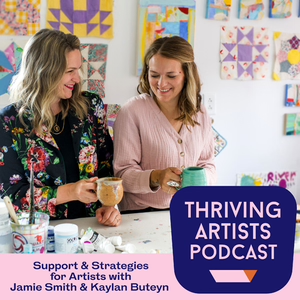
How to ask more open-ended questions
02/23/23 • 18 min
1 Listener
Today I’m returning to one of my favourite subjects - questions.
I’m going to explore open-ended questions in detail - not just what they are, but why they are important and when you can use them for the best engagement.
Plus, how can you get better at asking open ended questions and ask more of them in your programmes? How can you make sure that you don’t default to closed questions or recall questions?
I'm sharing 4 ideas that will help you to ask more open-ended questions & keep the conversation flowing in an open and engaging way.
Links
The Art of Questioning Class with Claire Bown
Download the 2023 Ultimate Thinking Routine List
Join the Slow Looking Club Community on Facebook
Download my free guide - how to look at art (slowly)
Curated newsletter by Claire Bown
Today I’m returning to one of my favourite subjects - questions.
I’m going to explore open-ended questions in detail - not just what they are, but why they are important and when you can use them for the best engagement.
Plus, how can you get better at asking open ended questions and ask more of them in your programmes? How can you make sure that you don’t default to closed questions or recall questions?
I'm sharing 4 ideas that will help you to ask more open-ended questions & keep the conversation flowing in an open and engaging way.
Links
The Art of Questioning Class with Claire Bown
Download the 2023 Ultimate Thinking Routine List
Join the Slow Looking Club Community on Facebook
Download my free guide - how to look at art (slowly)
Curated newsletter by Claire Bown
Previous Episode

How neutral do I have to be as a museum facilitator?
I often get asked about neutrality as a 'stance' for museum facilitators of discussions around art and objects. So today I'm addressing the question: How neutral do we need to be as a facilitator in the museum?
Facilitation is a key part of creating engaging and interactive discussions around art and museum objects.
As a facilitator, you are guiding the process, creating participation and activating the learning and engagement.
But do you have to be neutral too?
If you look at the general definition of a generic facilitator you will often see the word ‘neutral’ or ‘impartial’ used.
What do these words actually mean? And what should we be neutral about? Is it even possible to be neutral as a museum facilitator?
Neutrality is a tricky concept and this subject is always quite a thorny one in my classes and trainings. Listen to today's new episode to find out what I recommend.
Links
Download the Ultimate Thinking Routine List
Join the Slow Looking Club Community on Facebook
Curated newsletter by Claire Bown
Episode 5 - The Art of Facilitation
Episode 44 - The 4 Elements of a Great Introduction
Episode 84 - Why Inclusive Language Matters with Margaret Middleton
Next Episode

How to lead playful museum programmes
Today I’m exploring play in museum education practice. How can we create and lead playful museum programmes? How can we bring more opportunities for play into our guided tours and educational programmes?
I was inspired for today's post by our new theme in the Slow Looking Club. Every two weeks we have a new theme and right now we’re exploring play as the focus for our slow looking. We’re looking for depictions of play and playful approaches in art, but also how we can adopt a playful attitude to slow looking when we’re out and about.
This led me to thinking about how we can be more playful in our programmes when we are with visitors (of all ages, not just children) and incorporate more meaningful opportunities for play?
Today I'm sharing 9 ways that you can incorporate play into your guided tours and programmes.
Links
Download the NEW resource - how to look at art (slowly)
Episode 56 Learning to Love ‘Boring’ Objects through slow looking
Episode 45 - What we can learn from improv with Samantha Boffin
Episode 59 - 9 Thinking Routines to Improve your Powers of Observation
Episode 72 - Reacting to art with our bodies with Rachel Ropeik
Episode 25 - 3 Thinking Routines for Slow Looking and Drawing
Episode 61 - How mindfulness and drawing can help us to connect with art with Karly Allen
Download the Ultimate Thinking Routine List
Join the Slow Looking Club Community on Facebook
Curated newsletter by Claire Bown
If you like this episode you’ll love
Episode Comments
Generate a badge
Get a badge for your website that links back to this episode
<a href="https://goodpods.com/podcasts/the-art-engager-245896/how-to-ask-more-open-ended-questions-28292745"> <img src="https://storage.googleapis.com/goodpods-images-bucket/badges/generic-badge-1.svg" alt="listen to how to ask more open-ended questions on goodpods" style="width: 225px" /> </a>
Copy




